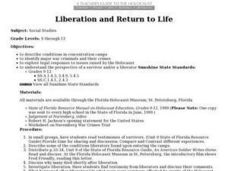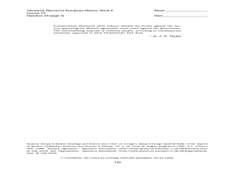Echoes & Reflections
Perpetrators, Collaborators, and Bystanders
After the Holocaust, the world grappled with how to bring justice to the Nazis. But what to do with the thousands—if not millions—who allowed it to happen? Young historians consider the issues of guilt, collaboration, and responsibility...
Curated OER
Do We Need a Permanenet International Criminal Court?: War Crimes, Violence, International Law and Politics, Nuremberg
For this lesson, students explore the history, relevance and current application of international tribunals for war crimes. Students look at cases from the Nuremberg trials, Tokyo trials and the Bosnian War.
Facing History and Ourselves
Justice After the Holocaust
Though there could be no true justice for the horrors of the Holocaust, many of those responsible for crimes against humanity were found guilty in the eyes of the law. Using primary and secondary sources in the 16th installment of a...
Curated OER
Prisoners in Another War
Learners identify violations of the Geneva Convention in video clips. They discover the role of international bodies in dealing with war crimes. They read primary source documents as well.
Curated OER
Genocide in World War II
High schoolers access a variety of websites that explore the Nazi German genocide of Jews in WWII. They view a film, complete a worksheet and write an opinion paper supporting the view to either punish or forgive the perpetrators of...
Curated OER
Liberation and Return to Life
Students read testimonies of Holocaust survivors, describe conditions liberators found upon entering camps, investigate liberation, and research background of the Office of Special Investigations and Nuremberg War Crimes Trials.
Curated OER
Munich: Peace in Our Time
Students examine the Munich Agreement. In this World War II lesson, students analyze the agreement made among Germany, the United Kingdom, France, and Italy. Students discuss the strengths and weaknesses of the agreement.
Curated OER
Lincoln and the "Writ of Liberty"
Learners debate and explore the rationale and ethics behind Lincoln's 19th century suspension of habeas corpus - the 'writ of liberty' and answer related questions.
Curated OER
The Holocaust
In this social studies worksheet, students read the story of the Holocaust and focus upon the outcome for the survivors. The students could write a summary.
American-Israeli Cooperative Enterprise
Jewish Virtual Library: The Holocaust:nazi War Crimes & Trials
A reference to Nazi War Crimes & Trials.
US Holocaust Memorial Museum
U.s. Holocaust Memorial Museum: War Crime Trials
Informative encyclopedia article describing the trials of major war criminals of World War Two. Most of these trials took place before representatives of the Allied powers known as the International Military Tribunal although some of the...
University of Missouri
Famous Trials: Nuremberg Trials 1945 49
A large selection of primary source documents, pictures, biographical sketches and much more about the famous war crimes trials held over a period of several years in Nuremberg after World War 2.
University of Missouri
Famous Trials: The Judges Trial
The story of the "Judges Trial," a trial held at Nuremberg of German law judges who had worked for the Nazis during World War 2.
Yad Vashem, The World Holocaust Remembrance Center
Yad Vashem: The Final Stages of the War and the Aftermath
This interactive article focuses on the final stages of WWII in Germany and the aftermath. It discusses death marches, survivors migrations, and Nazi war crimes and trials.
US Holocaust Memorial Museum
U.s. Holocaust Memorial Museum: The Hadamar Trial
Article about the first trial in the US zone in Germany for massed atrocities. In the Hadamar Trial, those responsible for the euthanization center at Hadamar were tried for the killing of foreign prisoners, because laws did not yet...
Harvard University
Harvard Law School: Thirteen Nuremberg Trials
The website currently provides information on the documents used in Case 1, 2, and 4 of the Nazi war crimes Nuremberg Trials.
US Holocaust Memorial Museum
U.s. Holocaust Memorial Museum: Eichmann Trial
Describes the trial of Nazi war criminal Adolf Eichmann that took place in Israel in the early 1960s. He was indicted on 15 counts of 'crimes against humanity' and in 1962 was executed by hanging.
Yad Vashem, The World Holocaust Remembrance Center
Yad Vashem: The Nuremberg Trials
Between 1946-1949 Nazis were put on trial for the atrocities they committed. The series of trials were known as the Nuremberg Trials and showed the world the inhumane conduct by the Nazis. Study these trials by viewing documents from the...
Google Cultural Institute
Google Cultural Institute: World War Ii Looted Art: Turning History Into Justice
Photographic exhibit explores the systematic looting of art in Nazi-occupied countries. These looted treasures were hidden in castles and salt mines in Austria and Germany and many have since been recovered.
A&E Television
History.com: Nuremberg Trials
Held for the purpose of bringing Nazi war criminals to justice, the Nuremberg trials were a series of 13 trials carried out in Nuremberg, Germany, between 1945 and 1949. The defendants, who included Nazi Party officials and high-ranking...
A&E Television
History.com: 10 Things You May Not Know About the Nuremberg Trials
The post-World War II trials marked the first-ever prosecutions for genocide and crimes against humanity. Held directly after World War II, the Nuremberg Trials were a series of 13 military tribunals in which nearly 200 German...
University of Missouri
Famous Trials: Trial of the Nazi Saboteurs (1942)
The eight Germans who landed on beaches were all graduates of a training school for saboteurs. The idea for a sabotage effort in America developed in late 1941, soon after a German spy network in the United States imploded when one of...
US Holocaust Memorial Museum
U.s. Holocaust Memorial Museum: Adolf Eichmann: Timeline
Follow a chronology of Adolf Eichmann's life and his participation in the "Final Solution" of the Nazis.
US Holocaust Memorial Museum
U.s. Holocaust Memorial Museum: Adolf Eichmann
This article details the life of war criminal Adolf Eichmann from his youth to his capture and execution.














